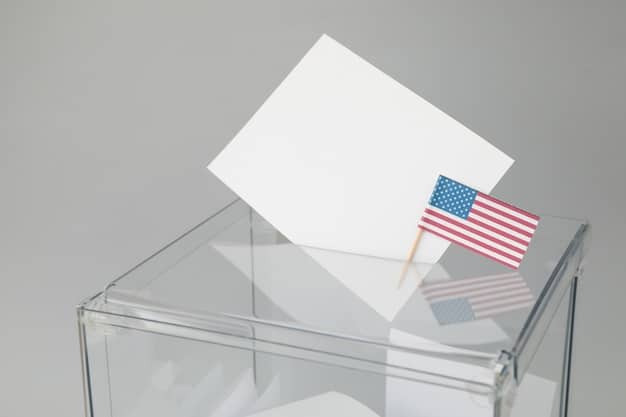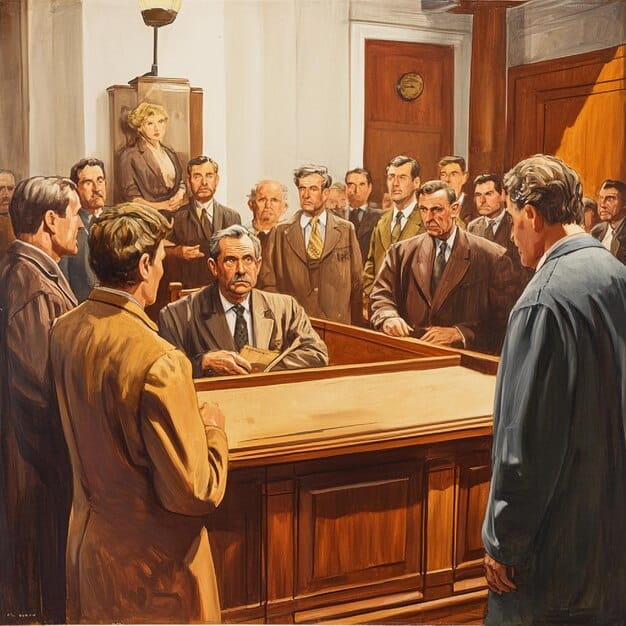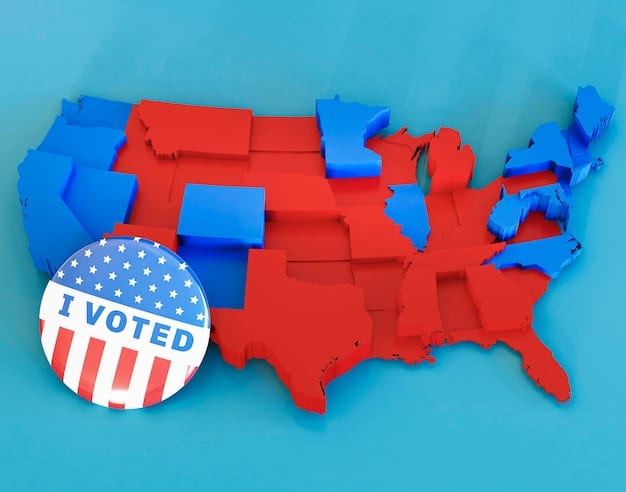Electoral College: Relevance in Modern US Elections?

Understanding the Role of the Electoral College: Is it Still Relevant in Modern Elections? The Electoral College, established by the U.S. Constitution, remains a subject of debate regarding its fairness and effectiveness in modern elections, raising questions about its continued relevance.
The **Understanding the Role of the Electoral College: Is it Still Relevant in Modern Elections?** is a hotly debated topic in contemporary American politics. Many question whether this system, designed in the late 18th century, still serves its intended purpose in the 21st century.
Understanding the origins of the electoral college
The Electoral College is a system established by the U.S. Constitution for electing the president and vice president. Understanding its origins is crucial for grasping its purpose and assessing its relevance today.
Historical Context
The Electoral College emerged from debates during the Constitutional Convention of 1787. The Founding Fathers grappled with how to balance the power of the populace with concerns about direct democracy.
Compromise and Design
The system was a compromise between electing the president by popular vote and electing the president by a vote in Congress. It aimed to give each state a proportional voice in the election process.
- Balancing state and federal power.
- Addressing concerns about uninformed voters.
- Providing a check on potential demagoguery.
The Electoral College aimed to create a buffer between the population and the selection of a president. This was particularly important in an era when information dissemination was limited.

How the electoral college works today
The modern Electoral College system differs slightly from its original design, but the core principles remain. Understanding how it functions today is essential to evaluating its impact on elections.
State-Based Allocation
Each state is allocated a number of electors equal to its total number of representatives in Congress (House + Senate). This means states with larger populations have more electors.
Winner-Take-All System
In almost all states, the candidate who wins the popular vote in the state receives all of that state’s electoral votes. This is known as the winner-take-all system.
- Maine and Nebraska use the district method.
- Electors are typically chosen by state parties.
- Most electors pledge to vote for their party’s nominee.
On Election Day, voters cast their ballots for a presidential candidate, but technically they are voting for a slate of electors who have pledged to support that candidate.
Arguments in favor of the electoral college
Despite criticisms, the Electoral College has defenders who argue it offers several benefits. These arguments often focus on protecting the interests of smaller states and promoting national unity.
Protecting Small States
The Electoral College ensures that candidates must appeal to a broad range of states, not just densely populated areas. This gives smaller states a proportionally larger voice in the election.
Promoting National Unity
By requiring candidates to build coalitions across multiple states, the Electoral College encourages national unity. Candidates must consider diverse interests and concerns.
Defenders argue that without the Electoral College, presidential campaigns would focus solely on large metropolitan areas, to the detriment of rural and less populated states.

Criticisms of the electoral college
Critics of the Electoral College argue that it undermines the principle of one person, one vote. They point to instances where the popular vote winner did not win the presidency as evidence of its flaws.
Disenfranchisement of Voters
The winner-take-all system means that in many states, votes for the losing candidate effectively do not count. This can lead to feelings of disenfranchisement among voters.
Potential for Minority Rule
The Electoral College can result in a president being elected without winning the popular vote, which some argue is undemocratic and can undermine the legitimacy of the office.
- The elections of 2000 and 2016 are often cited.
- Voters in safe states may feel their votes don’t matter.
Critics argue that the Electoral College disproportionately favors certain states, leading to candidates spending more time and resources campaigning in those states while ignoring others.
Historical instances and controversies
Several presidential elections have highlighted the Electoral College’s potential for controversy. Examining these instances provides valuable insights into its impact.
The Election of 1876
The election between Rutherford B. Hayes and Samuel Tilden was highly contested, with accusations of voter fraud and irregularities in several states. The outcome was ultimately decided by a special electoral commission.
The Election of 2000
The election between George W. Bush and Al Gore was one of the closest and most controversial in U.S. history. Gore won the popular vote, but Bush won the Electoral College after a Supreme Court decision halted a recount in Florida.
- The Florida recount dominated headlines.
- The Supreme Court’s role was highly controversial.
- The election raised questions about the legitimacy of the system.
These historical examples demonstrate how the Electoral College can lead to contested elections and questions about the fairness and democratic nature of the process.
Reforms and potential alternatives
Various reforms and alternative systems have been proposed to address the perceived shortcomings of the Electoral College. These proposals range from minor adjustments to fundamental changes.
National Popular Vote Interstate Compact
The National Popular Vote Interstate Compact is an agreement among states to award their electoral votes to the candidate who wins the national popular vote. It would take effect once enough states have joined to control a majority of electoral votes.
Proportional Allocation of Electors
Some have suggested allocating electors proportionally based on the popular vote within each state. This would eliminate the winner-take-all system and potentially lead to a more accurate reflection of voter preferences.
These reforms aim to address concerns about fairness, voter disenfranchisement, and the potential for a president to be elected without winning the popular vote.
| Key Point | Brief Description |
|---|---|
| 🗳️ Origins | Compromise at Constitutional Convention to balance state and popular vote. |
| ⚖️ Winner-Take-All | Most states award all electoral votes to the popular vote winner. |
| 🛡️ Small State Protection | Ensures candidates appeal to a broad range of states. |
| 🔑 Reforms | National Popular Vote Interstate Compact and proportional allocation. |
Frequently Asked Questions
▼
The Electoral College is a system established by the U.S. Constitution for electing the president and vice president. Instead of directly voting for a candidate, citizens vote for a slate of electors who then cast the actual votes for president.
▼
Each state is allocated a number of electors equal to its total number of representatives in Congress, which includes its representatives in the House and its two senators. This number can change every ten years following the census.
▼
If no candidate receives a majority of electoral votes (at least 270), the election is decided by the House of Representatives. Each state delegation gets one vote, and a majority of states is needed to elect the president.
▼
Supporters argue it protects the interests of smaller states, promotes national unity by requiring candidates to build broad coalitions, and ensures that all parts of the country have a voice in the election of the president.
▼
Critics argue that it undermines the principle of “one person, one vote,” can lead to a president being elected without winning the popular vote, and disproportionately favors certain states, leading candidates to ignore others.
Conclusion
The Electoral College remains a complex and controversial aspect of U.S. elections. While it has defenders who argue for its continued relevance in protecting the interests of smaller states and promoting national unity, it also faces strong criticisms related to fairness and democratic principles. Understanding its origins, function, and impact is crucial for engaging in informed debates about its future.





